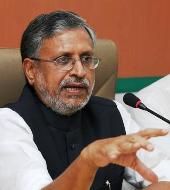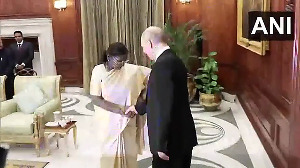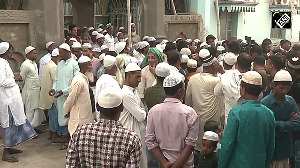
"The Congress, it has already lost its credibility and is not a force in Bihar."
"Modi has favoured Bihar a lot in the last five or six months."
"Our single-point agenda is to provide Bihar a good government after defeating the JDU-RJD-Congress maha gathbandhan (grand alliance)."
Bharatiya Janata Party senior leader Sushil Kumar Modi talks to Satyavrat Mishra about the prospects of the party in Bihar. Modi says only the assembly elections or general elections are the true barometers of popularity. Edited excerpts:
After an emphatic victory in this year's general elections in Bihar, your party failed in the assembly by-polls. You got only four of the 10 seats you contested. What went wrong?
We didn't perform as well as we had expected. We should have won at least a couple of more seats, but then the by-polls don't show the true measure of electoral support. By-polls are usually fought on regional issues and the might of the candidates matters more than that of the parties. On some seats, we didn't have strong candidates and there were no state-specific issues either.
Apart from these issues, we faced rebellion in our ranks too. For example, our rebel candidate swept 35,000 votes. I accept that in some constituencies our competitors had stronger candidates and in some places voters sympathised with parties that had lost the general elections. Therefore, every constituency had its own reasons for the result it presented.
The result of these by-elections is not the barometer of our popularity. In the 2009 assembly by-polls too, the National Democratic Alliance lost 13 of the 18 seats and then just a year later, the then Janata Dal-United-BJP combine won with a thumping three-fourths majority in the assembly elections.
By-polls depend on a lot of factors and their results don't necessarily represent true trends. Only the assembly elections or general elections are the true barometers of popularity. We are certain that the BJP combine will deliver good results in the assembly elections, which are scheduled at the end of next year.
Some of your leaders suggest that the party leadership's overconfidence is also a reason. Your comments?
That's not true. There were several reasons; some of them were beyond our control. We had to choose from the existing pool of candidates, and in some places our candidates were no match to those of our competitors. As I said, local issues and situations and social equations were not in our favour in many constituencies and, therefore, opposing parties won that by-poll.
These by-polls brought the JD-U, Rashtriya Janata Dal and the Congress together. How will you counter their combined might?
We are giving a strong challenge to the ruling coalition. Lalu Prasad, directly and indirectly, ruled the state for 15 years and his tenure is still considered as ‘Jungle Raj’ in Bihar. People still shudder with fear at the memory of those times, when they were forced to suffer a reign of terror.
It is because of this that Lalu Prasad's support base has dwindled to just two sections of society. Today his follower base is limited to just the Muslim-Yadav equation. The majority of people in the state will never accept Lalu Prasad as their leader. As for the Congress, it has already lost its credibility and is not a force in Bihar.
Meanwhile, the JD-U has already encashed the issue of good governance in the 2010 assembly elections. Therefore, now it has to face the wrath of anti-incumbency. Especially after June 2013, when the BJP and the JD-U parted their ways, the state government has reduced Bihar to the old days. The law and order situation has suffered.
There is no development in the state and the JD-U government has failed to come up with even a single development scheme in the last 19 months. It has failed on all fronts. Hence, there is a strong anti-incumbency wave in the state. It's been almost a decade now since the JD-U took over the reins of the state and people today are asking for change.
Nitish Kumar has to answer on all of these issues. He also has to explain why he resigned and the circumstances in which Jitan Ram Manjhi was appointed his successor. Bihar's electorate didn't vote for Manjhi, they voted for Kumar to counter Lalu Prasad. But
Kumar not only betrayed the electoral mandate, but he also joined hands with Prasad. People resent this and, therefore, the JD-U and Kumar will have to face their wrath. Today, Bihar wants a government that can work together with the central government. So we are confident that Bihar will choose the BJP and its alliance partners in the next assembly elections.
The BJP, today, prefers contesting elections on its own. Will you follow the same strategy in Bihar?
Different states have their own unique situations. Everybody knows why we had to break away from the Shiv Sena. Meanwhile, we have joined hands with the All Jharkhand Students Union in Jharkhand.
It's not that we don't want to contest elections in coalition with regional parties. In Bihar, we would like to contest the next election with Ram Vilas Paswan's Lok Janshakti Party and Upendra Kushwaha's Rashtriya Lok Samata Party. They are already ministers in the central government. We have fought the general elections together; we will also contest the assembly elections together. The details will be finalised later.
Our single-point agenda is to provide Bihar a good government after defeating the JDU-RJD-Congress maha gathbandhan (grand alliance).
There is clamour about a leadership crisis in the Bihar BJP. Several leaders have questioned your abilities, while others have thrown their hats in the ring to be the BJP's chief ministerial candidate. How would you respond?
The assembly elections are still a year away. We have not decided on faces, issues, strategies and so on. There have been no debates over this -- not even at the state level, let alone at the central level.
After the Jharkhand elections, our central leadership will focus on Bihar and Delhi since these are the only two states that will go to the polls in 2015. Every state has its own situation and there is no single formula. We will decide on these issues at a suitable time.
Many BJP workers have questioned the unchecked inflow of leaders in the party and demanded that preference be given to them in tickets distribution. How will the BJP leadership manage the ambitions of the new and old workers?
It's not the question of being an old guard or a newbie. Once a person joins the BJP, he or she automatically becomes eligible for a ticket. This time in Maharashtra and Jharkhand too, the party has given tickets to several new workers.
While giving the tickets, we focus on a candidate's capacity to win the election and their image. They should also believe in our principles.
Moreover, we usually field such candidates only in places where the party has not been very strong. Usually, such allegations are levelled by those who want tickets for themselves.
Prime Minister Narendra Modi had promised special status for Bihar. Why the delay?
We have promised special status for Bihar and we intend to fulfil our promise. It's been only six months since the new government took charge at the Centre. However, the current government in the state is fooling around. There has been no work on development schemes.
The state has failed to utilise the money sent from the central government for development purposes. Investors have turned away and not a single new industrial unit has opened in the last 19 months.
Tax breaks, which come with the special status, would have benefitted industrial units, but the current government doesn't even have land for them. Investment proposals amounting to more than Rs 5 lakh crore came to the state, but on the ground there has been investment amounting to just Rs 6,000 crore. The state government is not prepared to use tax breaks as a way of inviting investment.
More importantly, this government doesn't have the people's mandate. Kumar has joined hands with the Congress and Lalu Prasad, both of whom have repeatedly betrayed Bihar. We ask people to wait for another 10 months. Only the new government will have the right to ask for the special status.
Modi has favoured Bihar a lot in the last five or six months. He has given ample funds for the pending rail bridge projects in the state. This year's Budget had more than a dozen provisions, especially for Bihar. The Congress had not done anything for Bihar in its last 10 years rule.











